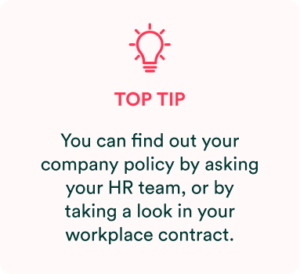Paternity leave in the UK is a joke. So we’ve taken Glassdoor’s Best Places to Work 2022 UK list and reordered it based on each company’s paternity leave policy.
Now you can compare your paternity leave policy against the Top 50 – click ‘rate my company’ below.
What's the problem?
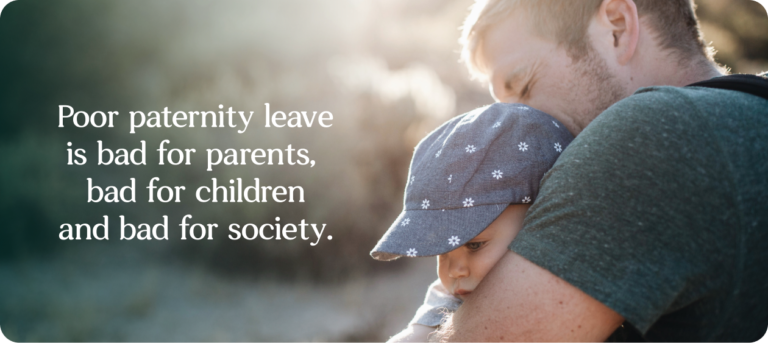
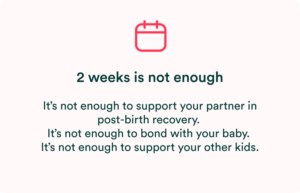
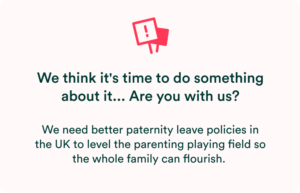
In the UK fathers/non-birthing partners are given a statutory allowance of £156.66 per week* for up to 2 weeks of leave for the birth of a child. This is the government baseline, which sets the standard for what workplaces are willing to offer.

The current laws around paternity leave can have a devastating impact on gender equality. It’s not surprising then, that as a childcare provider, an overwhelming majority of people who contact us are mothers. By not giving dads and non-birthing partners enough paid time off, women are forced back into their stereotypes as at-home carers, stunting their future career prospects and earning ability.
But paternity leave is good for men, good for women, good for children and good for society. And when paternity leave works, it has a positive impact on the family.
And this is the impact it can have

“Other companies should offer a paternity leave package like the one I received.”
Godwin Eke, 28 from London, one child (5 months)
For the birth of his first child, Godwin took just over four months of fully paid leave, out of the six months he was entitled to from his company, Goldman Sachs.
Godwin says: “My wife had unexpected complications during the delivery, so the fact that I was able to be around to help her recover and look after our daughter relieved a lot of stress for us both”.
Godwin felt that taking those four months out of work helped to strengthen his family unit.
He explains: “I was able to bond well with my child during the first few months, take on more of the childcare and household duties, and support my wife, who was struggling with her postpartum recovery.”
Overall, Godwin describes Goldman Sachs’ paternity leave policy as ‘forward-thinking’.
“I think other companies should follow suit and enhance their equal parenting leave policies”, he says.
Godwin goes on to say that more should be done both in and out of workplaces to remove any stigma associated with paternity leave. “Men often feel hesitant to disclose with others that they’re taking leave to spend quality time with their newborn. Let’s change that.”

“I campaigned for my company to offer better paternity leave, and won.”
Adam Jeffers, 38 from Manchester, two children (4 and 1)
Adam was offered two weeks of statutory paternity leave for the birth of his first child, however, he and his wife quickly realised this would not be enough.
“We decided that once our son turned six months old, my wife would return to work and I’d become the primary caregiver, so that my employer would have to grant me three months (unpaid) shared parental leave”, he says.
With Adam’s wife being very career driven, it also meant she was able to return to her senior marketing role fairly quickly, ensuring her career progression wasn’t affected, whilst Adam could take the time to bond with his son… all in all, it felt like the perfect solution.
But Adam felt compelled to push his company to do better.
He continues: “I was working at a major money comparison site at the time. Incredibly, I was only the second person at the company to take shared parental leave. Whilst I was off work, I campaigned for my employer to offer better leave for dads. In the end, they actually agreed to increase the paternity leave allowance to four weeks, and shared parental leave to six months, both fully paid”.
Recognising his efforts, Adam’s employer also gave him three months backdated pay for the time off he would have received, had the policy come into effect when he needed it.
Adam says: “We were thrilled when that pay came through… after months and months of saving, it was an unexpected but fantastic surprise.”
Having spoken to other fathers about their experiences, Adam admits: “Men who receive minimal paternity leave often feel they are unable to support their child during their early development months. Being able to spend more time with them is crucial.”

“I ended up taking my full holiday allowance to ensure I had enough time off.”
Mueez Oladejo, 27 from London, three children (6, 4 and 2 months)
When his first child was born, Mueez was self-employed, working as a DJ and children’s entertainer. This afforded him the flexibility he needed to spend more time with his newborn in those early months.
But when his second child was born, things were much more challenging.
Mueez explains: “I was working for a security agency at the time, and wasn’t entitled to any paid paternity leave as I joined two months after my child was born. I ended up having to juggle working full-time with caring for our first born, who was then a toddler, and we had a newborn who was experiencing health issues and was in and out of hospital. Plus my wife was going through her own recovery… it was a lot for us both.”
Sadly, it was a similar story when Mueez’s third child arrived.
He says: “I was working as a Water Hygiene Technician at the time, and my employer only granted me the standard statutory two weeks. My wife was having a C-section, and I knew from our previous experience that I needed more than two weeks off to properly support her.”
After discussing his options with his employer, who denied his request for further paid paternity leave, the only way Mueez could secure more paid time off was to use his full holiday allowance, which took him up to six weeks paid leave in total.
Reflecting on his experiences, Mueez says: “The year I took off for the birth of my first born was great – we’re best friends! It’s a shame because I didn’t have the same chance to bond with my second child, and as a result I feel we’re not as close as I’d like us to be. Third time around, I knew I absolutely had to take as much time off as I possibly could so we could strengthen our bond in those early weeks. But, it’s been at the expense of my wellbeing, as I’ve got no holiday days left for the rest of the year…I can’t take any more time off to support my wife with childcare during school holidays, and we can’t go away as a family outside of weekends.”

“I felt obliged to take what I was given, no questions asked”.
Daniel Revell, 29 from Hull, two children (6 and 2)
Daniel, who works at a charity, was offered the statutory entitlement of two weeks leave when both his children were born, but only one and a half of those were paid – which he later found out, is actually illegal.
And, as his paternity leave entitlement kicked in from the point of birth, Daniel wasn’t paid for the time he took off to be by his wife’s side during labour.
“It made me realise that I needed much more time off than I was given”, he admits. “Being a parent, particularly for the first time, is a constant learning experience and totally overwhelming at times.”
Daniel believes that based on his experiences, there is a huge stigma associated with dads taking paternity leave.
He continues: “I felt obliged to take what I was given, no questions asked. I didn’t know how to ask for or negotiate a longer leave period, so I accepted what my boss gave me even though I knew it wasn’t enough.”
Whilst Daniel isn’t currently planning on having more children, he says that he plans to actively encourage job-hunters to interrogate the paternity leave package that is being offered, before accepting a role.
He adds: “Every other working dad I know has only had one week of leave after having kids. It’s an issue we need to address head on.”
#PaternityLeague
We’d love to hear how paternity leave was for you. Whether good or bad, as a non-birthing partner or the one giving birth. If you’ve struggled or flourished because of good or bad policies impacting you, we want to hear that too.
Share your stories on social media using #PaternityLeague.
Our research
We conducted some research on paternity leave in the UK and here are some stats that might (or might not!) shock you.
A campaign for change

This is a campaign for change and we’ve partnered with The Fatherhood Institute to make an even bigger impact. We exist to help families flourish, and believe that family starts at day one. We want to make this happen, here’s how:
Paid time off for fathers/non-birthing partners to be increased to a minimum of 90% salary for 6 weeks leave (to be taken in the child’s first year).
For paternity leave and pay to kick in from the point of labour (so partners can support during birth).
For workplaces to openly state their paternity policies when advertising roles (actively promote them to male staff, and monitor take-up).
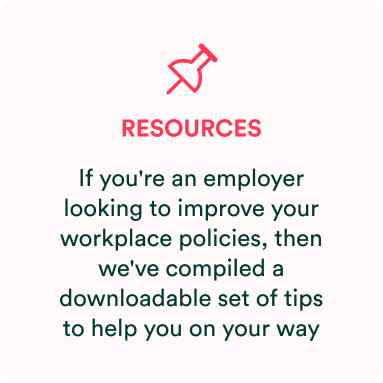
A new childcare business
Koru Kids is a tech start-up, whose bespoke digital platform helps families flourish by connecting them with vetted and trained childcare. From part-time after-school nannies to fill that afternoon gap, to full-time early-years childminding. Simple and streamlined searching, matching, interviewing, payment and tax, all under one roof. Set up in 2016 by our founder, Rachel Carrell, borne out of a need to improve the way childcare works in the UK.
FAQs
We know there’s an undeniable link between fathers/non-birthing partners taking adequate paternity leave, women/birthing partners doing better at work and feeling better, children feeling happier and the economy thriving. But the current state of paternity leave in the UK doesn’t foster gender equality, and doesn’t set parents up for success during those crucial early months with a newborn. We want to change that so that families can flourish – regardless of whether they need help with childcare or not.
To give as much financial support and time to families as possible whilst balancing our own needs as an early-stage Series A company, Koru Kids are able to offer 6 weeks paid at 100% salary for fathers and non-birthing partners taking paternity leave. This is the same as our mat leave offering – 6 weeks 100% pay on top of what the government offers.
The Paternity League Table looks at all the companies listed in Glassdoor’s Top 50 Best Places To Work 2022, and has reordered their ranking based on the paternity leave package they offer. Koru Kids does not appear on the Top 50 list, so was not included.
Unfortunately, some companies either were unwilling to provide information on their paternity leave package, or did not respond to our requests. Many companies still aren’t transparent about their paternity packages, and this is something that needs to change.
Those companies sitting at the top of the table, such as Diageo, are offering extremely generous paternity leave packages with leave/pay much higher than what we’re proposing as a base level requirement. It follows that our campaign ask is then sitting in the bronze tier, rather than gold/silver. In our view, if companies can offer a package as generous as those in the gold/silver tier, our ask of 6 weeks at 90% salary should be an achievable one for most and for the government.
*Statutory paternity leave is either 1 week or 2 consecutive weeks’ leave at a rate of either £156.66 a week or 90% of their average weekly earnings (whichever is lower). Tax and National Insurance are also deducted. Find out more on the Government website: https://www.gov.uk/paternity-pay-leave/leave
Tool methodology: Data has been collected directly from ranked companies, via their websites, by telephone and via email correspondence with HR teams. Once the data was collected we put in place a ranking system which aimed to rank both paternity leave and paternity pay from highest to bottom. These two metrics were ranked independently and a third rank was put in place to decide which company was the best based on both paternity leave and paternity pay. Where we saw two or more companies scoring the same for the combined ranking, the Glassdoor rank was used as the deciding factor for which company should be placed higher. In order to come up with a hypothetical paternity leave pay, we took the average salary of £24,600 (rounded up to £25,000) as per HMRC data which then enabled us to split the companies in the study into 3 distinct categories – Gold, Silver & Bronze. The calculation of the splits was based on the difference between the upper and lower salary value in our study which then was split into 3 thirds providing us with the following splits: £10,839 = Gold | £5421 – £10839 = Silver | £0 – £5420 = Bronze
